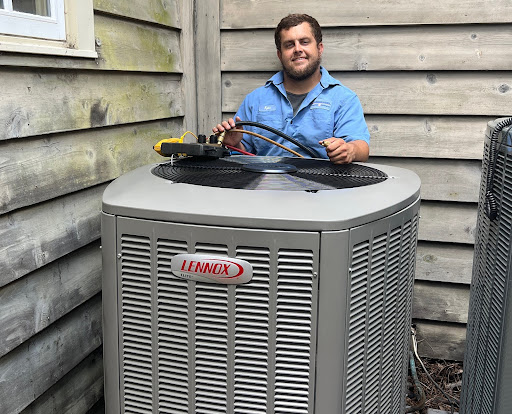As homeowners search for more sustainable and energy-efficient home heating and cooling solutions, heat pumps have emerged as a frontrunner. This technology, lauded for its ability to both heat and cool a space, represents an intriguing alternative to traditional heating systems and air conditioners.
But like any technology, understanding the benefits and drawbacks of owning a heat pump is crucial for homeowners considering this investment. In this blog, we’ll review the pros and cons of heat pumps to provide a holistic view of what installing one entails.
The Pros of Heat Pumps
If you’re considering installing a heat pump in your home for the first time, you probably want to know what you can expect from these HVAC systems. It’s important to be aware of the benefits and drawbacks of owning a heat pump so that you can make an informed decision that benefits your household for many years. Let’s start by going over some of the most notable heat pump pros.
Energy Efficiency at Its Best
At the heart of the heat pump technology is its remarkable energy efficiency. Unlike traditional furnaces that generate heat by burning fossil fuels or electric furnaces that convert electricity directly into heat, heat pumps work by extracting heat from the outdoor air, even in frigid conditions, and transferring it indoors. This process requires significantly less energy, leading to lower energy bills and less environmental impact. The efficiency of air source heat pumps, a common type of heat pump, is particularly notable for its ability to reduce energy consumption while maintaining optimal heating and cooling.
Dual Functionality: Heating and Cooling
One of the most appealing benefits of owning a heat pump is its dual functionality. A single heat pump unit can replace both a conventional air conditioner and a heating system, providing year-round comfort. This not only simplifies the HVAC system in a home but also can lead to cost savings by eliminating the need to purchase, install, and maintain separate heating and cooling systems.
Environmentally Friendly
Heat pumps provide an eco-friendly alternative to traditional heating systems that typically rely on natural gas or other fossil fuels. By leveraging heat energy from the air, heat pumps produce significantly fewer greenhouse gas emissions. This reduction in fossil fuel consumption not only benefits the environment but can also contribute to a home’s overall sustainability profile.
The Cons of Heat Pumps
Although there are many advantages to installing a heat pump, it’s crucial to consider the potential drawbacks to ensure it’s the right decision for your home.
Upfront Costs and Installation
While the long-term energy savings of heat pumps are undeniable, the initial investment can be a significant barrier for some homeowners. The overall cost of purchasing and installing a new heat pump system is typically higher than that of traditional systems. The upside of installing a heat pump is that you can qualify for a considerable tax credit for your energy-efficient purchase. Additionally, utility companies often provide rebates for choosing this eco-friendly option.
Performance in Extremely Cold Temperatures
Although modern heat pumps are designed to operate efficiently in cold weather, their performance can diminish as the temperature drops to sub-freezing levels. Heat pumps are a great choice for Mississippians since we very rarely dip below freezing.
Longevity and Maintenance
Heat pumps are complex systems that require regular maintenance to operate at peak efficiency. The lifespan of a heat pump, while comparable to other HVAC systems, can be influenced by the rigor of maintenance and the harshness of the operating environment. This means that to maximize the benefits of a heat pump, homeowners must commit to regular servicing.
Weighing the Benefits and Drawbacks of Owning a Heat Pump
As we’ve explored, the pros and cons of heat pumps paint a picture of a technology that offers significant advantages, particularly in terms of energy efficiency and environmental impact. Since we live in a mild climate, heat pumps are an attractive option, especially for those looking to reduce their energy bills.
The Role of Professional Installation and Maintenance
The efficiency and longevity of a heat pump significantly depend on proper installation and regular maintenance. Choosing a reputable team like Environment Masters for the installation ensures that your heat pump is correctly sized and installed, optimizing its performance and energy efficiency. Professional maintenance can also prevent common issues, extend the life of your heat pump, and ensure it runs efficiently, providing peace of mind and savings in the long run.
Install a Heat Pump With Environment Masters!
If you’re considering transitioning to a more energy-efficient and environmentally friendly heating and cooling solution, now is the time to explore the possibility of installing a heat pump with Environment Masters. With expertise in heat pump installation and a commitment to high-quality service, we can guide you through the process, from selecting the right system to professional installation and maintenance. Embrace the benefits of a new heat pump system and join the ranks of homeowners who are not only enjoying lower energy bills and enhanced comfort but are also contributing to a more sustainable future!
Now that you know the pros and cons of heat pumps, contact us today for more information about our heat pump installations and how to make the switch to a more energy-efficient heating and cooling solution. Whether you’re looking to install a brand new HVAC system or need air conditioning repair in Jackson, MS, or the surrounding area, Environment Masters has you covered.
Embracing heat pump technology with the help of Environment Masters is more than just an upgrade to your home’s HVAC system — it’s a step toward improved comfort that can also help you significantly save on your utility bills!

